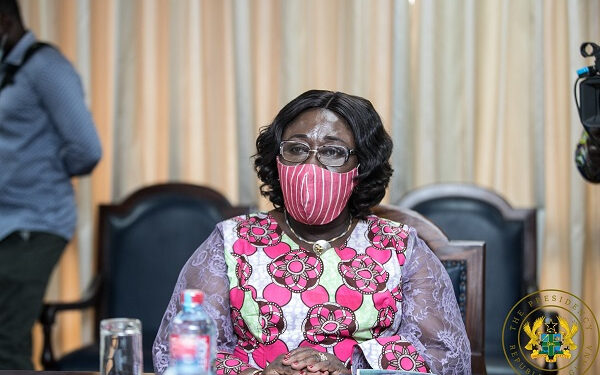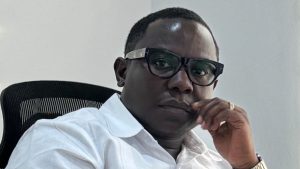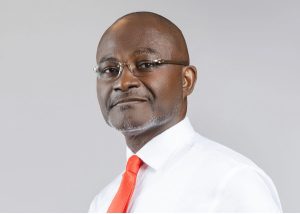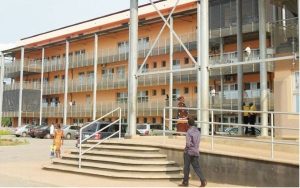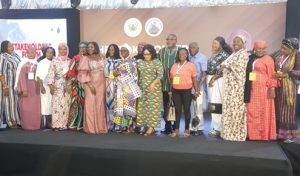The Chief of Staff, Mrs Akosua Frema Osei-Opare has revealed that Ghana is steadily working towards a comprehensive and universal social protection programming which is a requisite safeguard and a pedal to accelerate sustainable development.
This she noted would guarantee that as much as possible, all members of society irrespective of age, gender, ethnicity, geographical location, education, disability and status in society live dignified lives.
Mrs. Akosua Frema Osei-Opare stated these when she delivered her keynote address at the 2021 University of Ghana Alumni lectures, under the theme, Social Protection in Ghana; Are we on track?
The Chief of Staff opined that the state has provided an appreciable amount of social protection in the last 20 years.
She noted that research data from the National Health Insurance Authority indicates that as of September 2021, the authority had recorded a total membership of twenty-four million, four hundred and four thousand, five hundred and fifty-seven (24,404,557).
Out of this total, 63.4% that is, fifteen million, four hundred and seventy-two thousand, four hundred and eighty-nine (15,472,489) persons were exempted from the payment of premium and processing fees as a condition for enrolment. These exemptions are granted to indigents, prison inmates, persons with mental disorders, persons in foster homes/leprosaria, pregnant women, TB patients and children under the school feeding programme and LEAP beneficiaries.
The Chief of Staff added that another significant social protection initiative of the government is the Ghana School Feeding Programme (GSFP), which targets public schools in urban and deprived communities to eradicate hunger and improve nutrition.
She said at the inception of the programme, 10 pilot schools drawn from each region of the country participated. By August 2006, the School Feeding programme had been expanded to 200 schools covering 69,000 pupils in all the 138 districts at the time and the coverage has steadily increased in selected schools in all Metropolitan, Municipal and District Assemblies. Currently, the school feeding programme has reached 3.4 million pupils in 10,560 schools nationwide.
It is important she said to underscore that in 2018, GSFP achieved an unprecedented 30% expansion of coverage (of both schools & pupils) and also increased feeding grant from eighty pesewas (GHC 0.80) to one cedi (GHC 1.00) per pupil per day. Ghana School Feeding Programme Cost-Benefit Analysis Report shows that the school feeding programme has a clear impact on enrolment for both boys and girls.
The former Member of Parliament for the Ayawaso West Wuogon constituency also accentuated the positive impact LEAP has had on the vulnerable and poor communities in Ghana.
She said its implementation commenced in 2008 with 1,654 households in 21 Districts and currently (2021) has been expanded to cover 344,023 households comprising over 1.5 million individuals across all districts in Ghana.
She added that expenditure has also more than tripled from about GH¢60 million in 2008 to over GH¢ 190 million by the end of 2019. Depending on the household beneficiary composition, the bi-monthly cash grants range from GH¢ 64, GH¢ 72, GH¢88 and GH¢106. Even though these amounts may appear small, their impact on these households remains tremendous. Impact studies conducted (by ISSER in collaboration with the University of North Carolina and UNICEF in 2016) on the programme indicate improvements in school enrolment by (12%), food security (65%), and investments in Productive Inclusion Livelihoods (63%).
Given that the LEAP programme as a social protection intervention is currently covering 344,023 households, Mrs Osei-Opare declared the intention of the Akufo-Addo government as stated in the 2022 National Budget is to expand coverage of the programme by 150,000 more households. This means that in 2022 LEAP would reach 494,023. If we had an integrated poverty profiling system in place, potentially, LEAP would be reaching about 90% coverage.
She used the occasion to express optimism on the future of social protection programs and interventions in the country.
‘I would like to reiterate the point that, this country is pursuing a strong social protection agenda for the vulnerable that increasingly guarantees provision for good healthcare, education, poverty alleviation and support for persons with a disability she said.
Mrs Akosua Frema Osei-Opare used the opportunity to call on the Ministry of Gender, Children and Social Protection to have a national dialogue to unlock innovative ideas to tighten the delivery of Ghana’s social protection agenda.
‘As we vigorously pursue the social protection agenda, to make it universal, I reiterate the call to the Ministry of Gender, Children and Social Protection to convene a national social protection dialogue, of all key stakeholders in order to identify sustainable financing mechanisms, generate stakeholder commitment, explore sustainable public-private partnerships and to unlock innovative ideas to tighten the delivery of Ghana’s social protection agenda so that nobody is left out!’
By: Isaac Clottey

